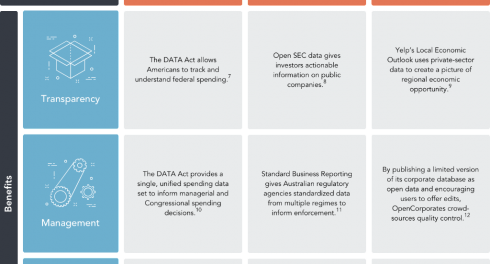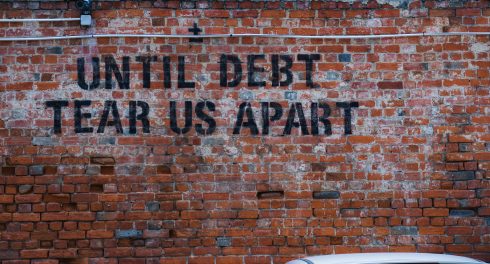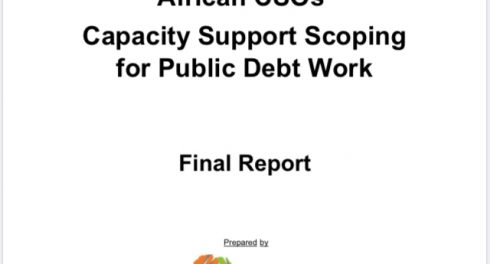Highlights:
- Restoring the fourth estate
- Essential ideas
- Catch more voters with honey than vinegar
- Spending say = happy to pay?
- Digitally divided all over again
- How to run your own foundation
- TAI spotlight: Philanthropy preserving press freedom to strength in numbers
In case you missed it…
Restoring the fourth estate
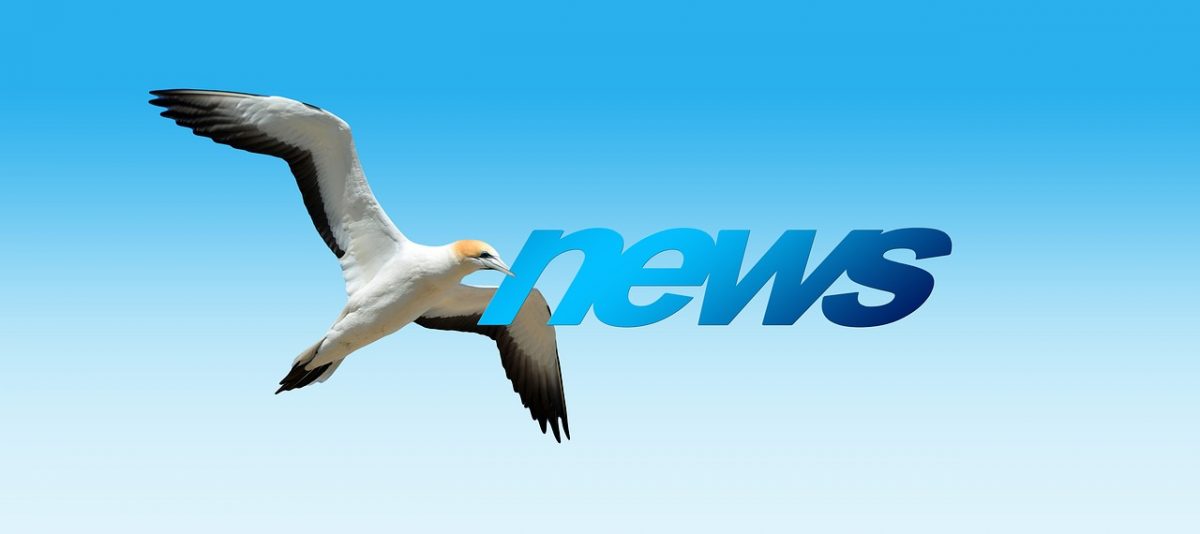
Photo: Pixabay
Last Friday was #WorldPressFreedomDay. As the UN Secretary-General put it: “No democracy is complete without access to transparent and reliable information. It is the cornerstone for building fair and impartial institutions, holding leaders accountable and speaking truth to power.”
Yet in too many jurisdictions it is not just journalistic integrity at threat but the lives of journalists themselves. According to the International Federation of Journalists 94 journalists were killed in 2018 (see graphic). Many more were imprisoned or faced growing restrictions. Today’s release of Reuters journalists in Myanmar is all too rare good news. Just last week, Russian President, Vladimir Putin signed a divisive bill that critics say will further limit the country’s media freedom.
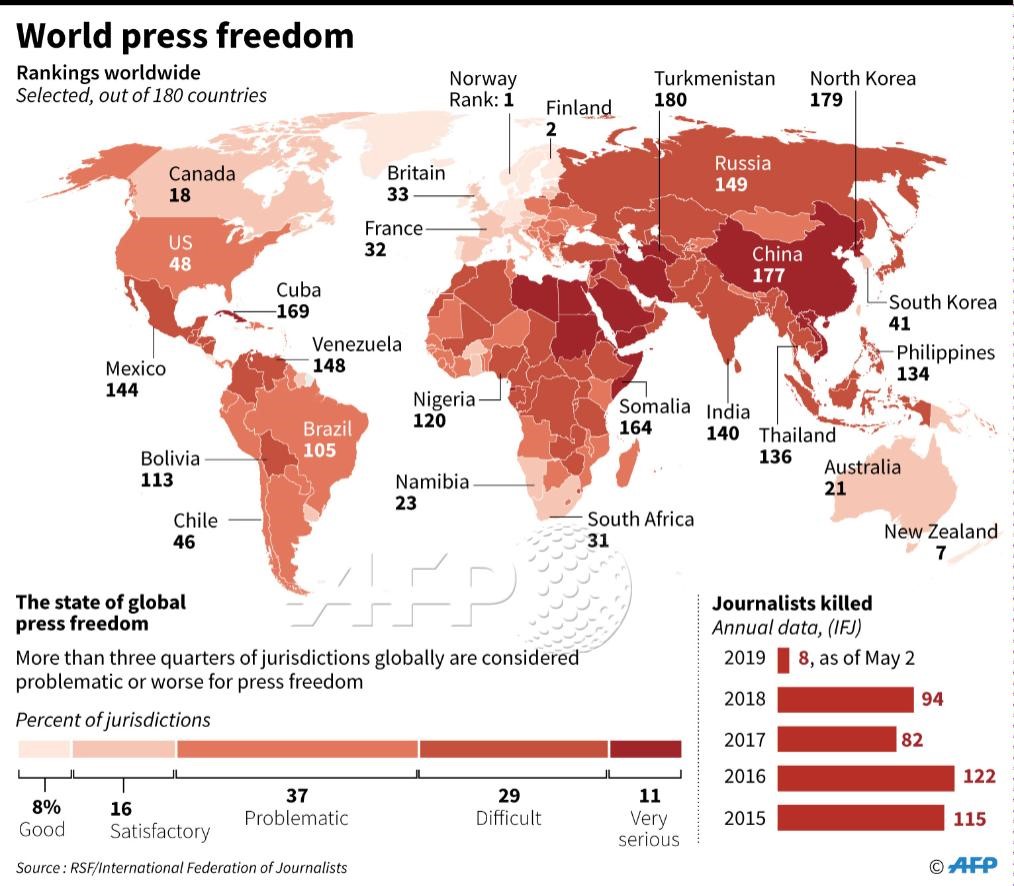
What to do? David Keya had a special call to action for governments to take immediate and sustainable action to ensure safety of journalists, the independence of the media, and the plurality of voices. He suggests we find ways to stigmatize and penalize those that attack journalism, and devoting resources to the great project of media freedom. Specific suggestions will be welcomed ahead of the Media Freedom Summit that the UK is hosting in July.
Why are many governments feeling emboldened to attack the media? Likely in part as media credibility has been weakened. New polls from Afrobarometer report show a plurality of Africans now support government restrictions on media. Why? Jeff Conroy-Krutz argues that Africans don’t like what they are seeing in the media of late. He points to problems of media bias, a focus on narrow viewpoints, the poor quality of journalism from many outlets, the rise of hate speech and the rise of ‘fake news’.
This suggests that the physical protection of journalists is only one part of a broader effort needed. Stephen King, CEO of Luminate, calls on philanthropy to help support robust responses to help independent media meet the ongoing global crisis (See more in TAI Spotlight). That should include shoring up financial sustainability. Yet do we need new realism on what is possible in terms of shoring up public interest journalism at scale? As the Wall Street Journal reports between 2010 and 2015, foundations gave $80 million to local and state nonprofit news organizations. That amounted to less than one one-100th of the $8.3 billion in revenue that newspapers lost during that time.
Essential ideas
Did a great idea strike in the shower this morning? Don’t let it go to waste. The deadline is fast approaching to submit project ideas for the second Paris Peace Forum. Is it a really big idea? If so, go the whole hog, and imagine what you could do with $100 million as MacArthur Foundation launches the next round of its 100 and change challenge.
Catch more voters with honey than vinegar
As India is currently in the midst of the largest electoral exercise on the planet, candidates there would do well to consider what sort of messaging might turn out voters. To that end, a recent study by Christopher B. Mann, Kevin Arceneaux, and David W. Nickerson found not much evidence around negatively framed messages motivating real-world political behavior as compared to the positively framed messages.
It’s hard to know what was the bigger factor in motivating a subset of the Sudanese people on to the streets – disgust at a corrupt regime or a vision of a better alternative. Either way, the ouster of President Omar al-Bashir is a telling reminder of the importance of people power. José María Ibañez felt that power, too, as protestors covered his house in eggs and toilet paper in Paraguay – another example of how people have successfully employed protest and public humiliation as weapons of last resort to remove from power corrupt officials. Cyril Ramaphosa is hoping to head off ANC officials facing similar fates by taking a strong anti-corruption stance ahead of South African elections, including barring those found guilty of corruption or state capture from public office and ANC positions.
What to do when public pressures do create opportunities for anti-corruption reform? One of our members, OSF, has a consultancy out to package options (and another on anti-corruption narratives – see Calls below). CurbingCorruption.com may provide some inspiration – offering sector by sector knowledge of corruption reforms, shared and developed Wikipedia-style.
Paul Lagunes discusses research suggesting CSO oversight can curb corruption and inefficiency in public infrastructure development, when supported by the relevant authority. How can we encourage more effective partnerships between anti-corruption agencies and anti-corruption civil society groups?
Returning to Omar al-Bashir, we note that he is now being charged with money laundering and financing terrorism. Yet such legal ramifications are still all too rare. The Financial Times picks up on Global Witness reminders of the lingering weaknesses of UK corporate ownership disclosure, while David M. Luna, former chair of the OECD Task Force on Countering Illicit Trade, details how anonymous companies facilitate the illicit trade in counterfeit and pirated goods. That reminded us of a piece on how anti-money laundering legislation could impact the art market. Gotten a hidden Rothko or Vermeer? Read on.
Spending say = happy to pay?
Did you know that Brazilian municipalities that adopted participatory budgeting programs collect 39% more taxes than similar municipalities without such programs? So says new World Bank research. But do we need government at all to have impactful, participatory institutions? Lindsay Mayka argues perhaps not, that while state neglect limits their involvement in decision making, society-driven participatory institutions can still develop important policymaking roles in agenda setting and in monitoring and evaluating public policy. Her research suggests that both scholars and TAP practitioners should pay more attention to how civil society can drive institutional change processes.
How else might governments improve tax compliance? Uganda provides a test case with Princeton releasing a whole history of reforms by the Uganda Revenue Authority (part one and part two) over the past 15 years from bringing millions of unregistered citizens into the tax net, tightening oversight of existing taxpayers who were paying less than their fair share, targeting wealthy and politically connected individuals, and creating a separate unit to press government departments that failed to remit to the URA the taxes they collected. These helped increase the country’s tax-to-GDP ratio to 14.2% in the 2017–18 fiscal year from 11.3% in 2013–14.
Attendees at the recent Financing for Development Forum checked in on the viability of paying for all that’s needed to reach the sustainable development goals. Check out the outcome statement which includes conclusions and recommendations for government. Debt worries are increasingly front of mind for funders and policymakers alike. Are they sufficiently on the mid of civil society activists and researchers? Our new consultancy with OSF will attempt to find out.
Essential Listening
 Oliver Bullough discusses his new book Moneyland: The Inside Story of The Crooks And Kleptocrats Who Rule The World, detailing how the lawless, stateless superrich exploit legal loopholes to launder and protect their assets. Listen Now!
Oliver Bullough discusses his new book Moneyland: The Inside Story of The Crooks And Kleptocrats Who Rule The World, detailing how the lawless, stateless superrich exploit legal loopholes to launder and protect their assets. Listen Now!
Digitally divided all over again
Do you see algorithm control as creating a new digital divide? Anjana Susarla demonstrates a future where opting out of algorithmic curation is a luxury for the affluent few. She argues that the next stage of digital literacy is not just using a computer or the internet but also understanding and evaluating the consequences of a plugged-in life. For now, the burden will be on users to learn how to take control of the algorithms in their lives.
Talking of control, should we consider internet shutdowns an effective way of reducing violence? Sri Lankans have been debating the merits of their government’s clampdown on social media access citing the need to protect citizens from further unrest and misinformation. Where’s the evidence? Jan Rydzak argues that existing research shows shutdowns are ineffective for reducing violence — but do create economic harm and violate human rights. Elsewhere, authorities in Benin turned off the country’s internet during parliamentary elections earning their position as the ninth African country to censor internet this year. Salem Solomon highlights the serious economic and social impacts of even a short outage.
We’ve mentioned our TAI frustrations on trying to use International Aid Transparency Initiative (IATI) data, but perhaps some good news this week as Publish What You Fund launched IATI Canary, a free data monitoring and alert service. It checks to ensure IATI data is both available and compliant with the IATI schema.
Staying on the themes of data and evidence, we are excited to test out two new blogs – IDinsight on using data and evidence to improve lives and Missing Numbers about data the British government chooses not to collect and what that might say about results in certain policy areas.
Long Read
This report identifies opportunities for donors, governments, investors, the private sector, and other stakeholders to explore and accelerate the appropriate development and cost-effective use of AI at scale in global health.
How to run your own foundation
Come into big money? Why not start a foundation? The Center for Effective Philanthropy offers four tips on how to do so: be bold, hire staff with aligned expectation, learn from others and be humble. Pam Foster makes a case for how engaging in collaborative philanthropy can be of great benefit to those new to the field (hear, hear!) Collaboratives can aid in building the strategy and skills to achieve real impact more quickly and effectively.
When starting a new foundation not all things might go as planned. It’s also good to think of ways to handle failure if it happens. Nonprofit AF offers insight on the dynamics of failure. Such failure gives the illusion of risk-taking and progress, when we are actually risk-averse and not making progress.
Finally, benefit from a curation of resources on evaluation results, tools, and knowledge around the philanthropic sector by the Foundation Review. See the current issue on foundation learning. Thinking of creative ways to map your monitoring, evaluation, and learning journey and progress? Check out this list of resources curated by Alan Hudson and stay tuned for more maps from them. Finally, for more ideas on visualizing data borrow some tips from Stephanie Evergreen. Quick fixes like adding in intentional color, icons, alignment, and narrative will make a big difference!
TAI spotlight
How to learn from evidence: A solution context in approach brief
Our new brief lays out a twofold approach for how donors and practitioners can successfully engage with evidence to inform their work on information and non-electoral accountability. Read here a summarized version of the brief.
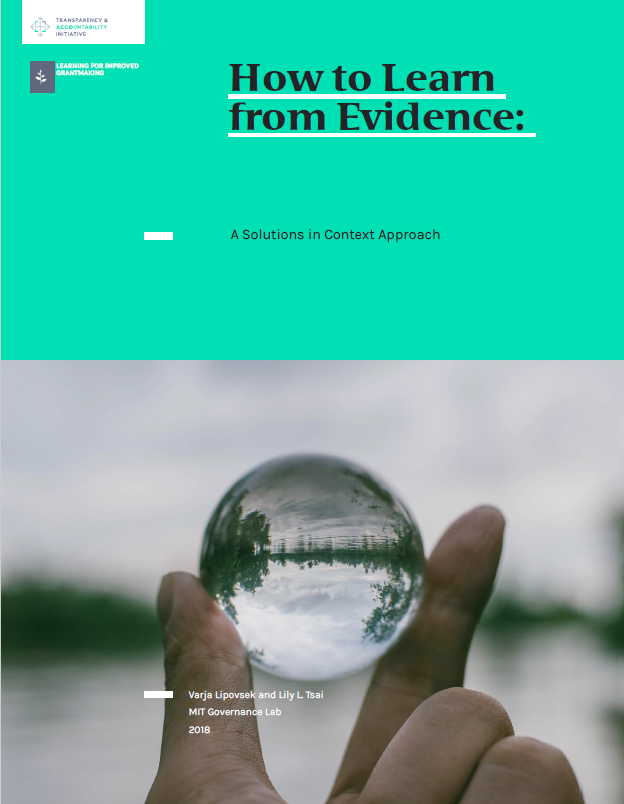
How philanthropy can preserve press freedom | Luminate
Stephen King, Luminate CEO shares thoughts on how philanthropy can support press freedom.
100$Change competition | MacArthur Foundation
The Foundation has launched its next 100&Change competition for a $100 million grant to fund a single proposal that will solve a significant problem.
Supporting groundbreaking journalism | Luminate
Nishant Lalwani highlights their work in funding independent media and press freedom and calls upon more foundations to support the media.
Africa Transitional Justice Legacy Fund | MacArthur Foundation
The Foundation launched this new fund to strengthen civil society’s capacity to engage with and advocate for national and regional transitional justice processes in Africa.
Strength in numbers | Hewlett Foundation
Ruth Levine shares why it is important for foundations to spread bets, the benefits, and complications.
Calls: Proposals, papers, speakers and course invites
- Open Society Foundation Call for Consultant: Anti-corruption Narratives – May 8
- 2019 Call for projects for Paris Peace Forum – May 13
- OSF/TAI Consultancy: Debt Implications for Fiscal Programming in Africa – May 14
- Call for Papers: The Global Asset Registry Workshop – May 15
- Call for Abstracts: MIT GOV/LAB 4th Political Behavior of Development Conference – May 15
- 4th Global Call for Proposals for CSOs and CSO Networks – May 15
- Crowdsourcing case studies for the Innovation Report for 2019 on Civil Society – May 31
- Hewlett Foundation’s Call for Proposals to Coordinate Global Research, Learning, and Norms for Participatory Budgeting – May 31
- OSF Consultancy: Scoping Learning Needs during Anti-corruption Learning Opportunity – June 3
- Call for Applications: 100&Change: July 16
On the calendar
- The CEP Conference – May 7-9, 2019 (Minneapolis, USA)
- Csv, conf, v4 – May 8-9, 2019 (Eliot Centre, Portland)
- 2019 Forum to Advance Women’s Leadership in the Global Development Sector – May 14, 2019 (Washington, DC)
- Collective Impact Forum Convening – May 14-16, 2019 (Chicago, USA)
- Policy Dialogue Day 2019 – May 22, 2019 (Gothenburg, Sweden)
- The 2019 Media Impact Forum: Radio Active Culture – May 23, 2019 (Philadelphia, USA)
- 2019 Open Government Partnership Global Summit – May 29-31, 2019 (Ottawa, Canada)
- Women Deliver 2019 Conference – June 3- 6, 2019 (Vancouver, Canada)
- RightsCon Tunis – June 11-14, 2019 (Tunis, Tunisia)
- InterAction Forum 2019 – June 11-13, 2019 (Washington, DC)
- Global Conference on Transparency Research – June 26 – 27, 2019 (Rio de Janeiro, Brazil)
- Tax Justice Network Conference 2019 – July 2 -3, 2019 (City, University of London, UK)
- ATI/ITC Tax and Development Conference 2019 – July 2 -4, 2019 (Berlin, Germany)
- Global Symposium (COPGS) on Citizenship, Governance, and Accountability in Health – October 15-18, 2019 (New Delhi, India)
- What Works Global Summit 2019: Building Evidence – October 16 – 18, 2019 (Mexico City, Mexico)
- Global Perspectives 2019 – October 29 – November 1, 2019 (Addis Ababa, Ethiopia)
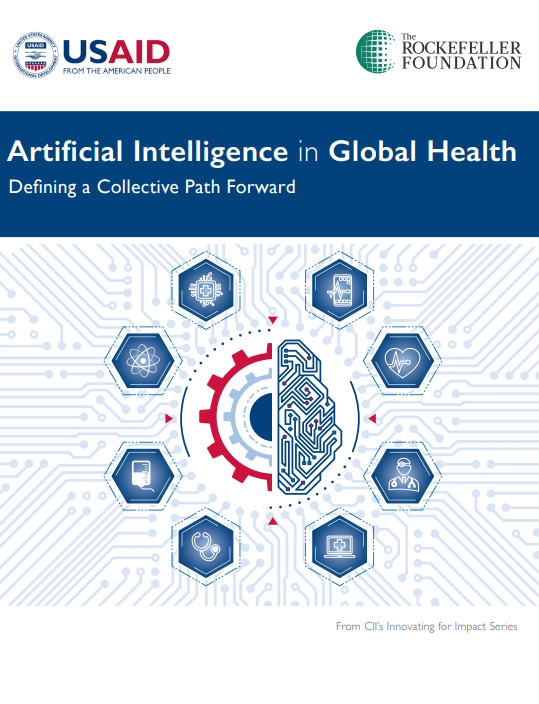 Artificial Intelligence in Global Health: Defining a Collective Path Forward by The Rockefeller Foundation, USAID’s Center for Innovation and Impact (CII) have partnered, and the Bill & Melinda Gates Foundation.
Artificial Intelligence in Global Health: Defining a Collective Path Forward by The Rockefeller Foundation, USAID’s Center for Innovation and Impact (CII) have partnered, and the Bill & Melinda Gates Foundation.